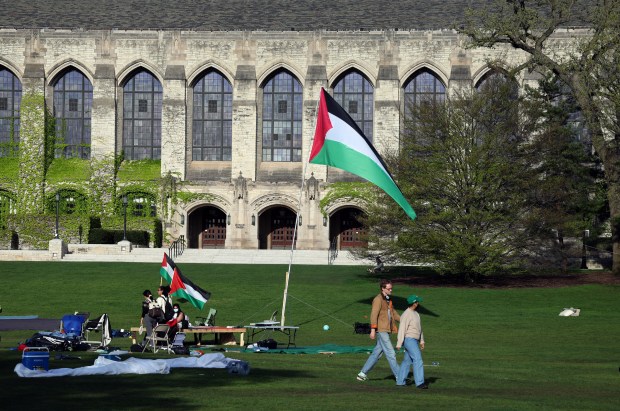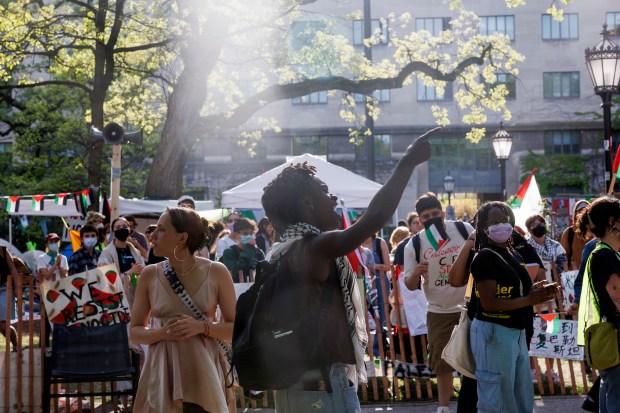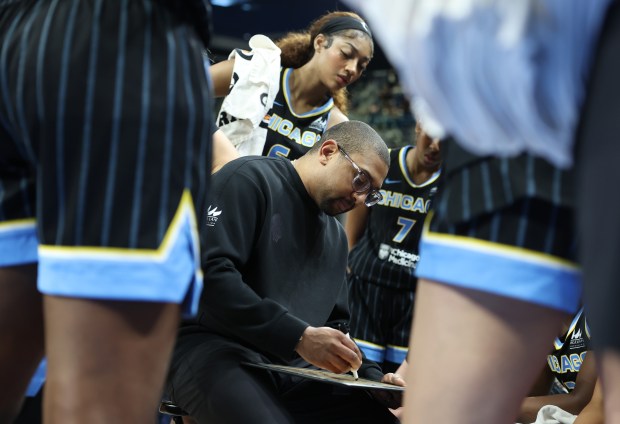Surrounded by the “Refaat Alareer library,” a makeshift food center, library and donation center on the University of Chicago’s Hyde Park campus, Andrew Basta said the school’s pro-Palestine protest has been a “beautiful” and “peaceful” part of nationwide campus activism.
The fourth-year student has been inside the encampment at the U. of C.’s Main Quadrangle for more than two days.
That doesn’t mean Basta isn’t worried about police intervention or repression of the sort he said he’s recently seen at other college campuses. In fact, he expects it.
“This university has, for its entire history, been last to change, and has refused to support students and workers,” Basta said. “There’s definitely a high chance they repress students and bring in a violent police force.”
But as of Wednesday evening, a peaceful detente remained between U. of C. officials, the protesters spread out in tents on the campus lawn and the handful of police watching nearby. That sense of calm can also be found on other local college campuses where protests are in progress.
As pro-Palestinan protest encampments popped up at dozens of college campuses across the U.S. in recent weeks amid the mounting death toll in the war in Gaza, universities have had divergent responses. Many schools, including Columbia University in New York City, have called in law enforcement to douse demonstrations, leading to more than 1,000 arrests nationwide and, at times, violent confrontations with police.
Meanwhile, in rarer instances, other schools — including Northwestern University — have struck agreements with protest leaders to restrict the disruption to campus life and upcoming commencement ceremonies. As hundreds at Chicago-area campuses call for their schools to divest from Israel and weapons manufacturers, demonstrations have remained relatively subdued, with little to no police intervention. However, some students and experts say they worry about the possibility of escalation.
Officials from the University of Chicago did not respond Wednesday to requests for comment on potential police involvement, although they’ve previously said they will intervene only if the protests disrupt the functioning or safety of the university.
Chicago police Superintendent Larry Snelling said that as long as protests are peaceful and “there’s no violence,” the Police Department will “make sure that people who want to protest can do it and exercise their First Amendment.”
“If you notice with our universities here, people are protesting peacefully. … We’re not engaging them in a way that’s going to inflame what it is they’re trying to do,” Snelling said Tuesday at a Community Commission for Public Safety and Accountability meeting. “If people are just trying to have their voices heard, hey, this is America. It’s their choice and it’s our responsibility to protect them while they do it.”
Cook County State’s Attorney Kim Foxx said representatives from several local universities didn’t raise complaints in a Tuesday meeting about prosecutors’ long-standing policy not to prosecute peaceful protesters.
Sheila Bedi, a law professor at Northwestern, said she hopes Chicago-area universities continue to refrain from calling in law enforcement on students and that students are allowed to express their views safely on campus. She said it’s important to “reject the idea that what’s happening in Los Angeles or New York City is acceptable or is some sort of norm.”
“My hope is that Chicago university officials will continue to recognize students’ right to protest and also continue to recognize that calling in the Chicago Police Department, unleashing the department on students who are organizing, is a recipe for brutality against our students and also would incur significant liability legal liability on the part of the universities,” Bedi said.
Officers stormed a Columbia building occupied by pro-Palestinian protestors late Tuesday, arresting dozens. Meanwhile, the University of California, Los Angeles canceled classes Wednesday after dueling groups of protesters clashed overnight, shoving, kicking and beating each other with sticks after pro-Israel demonstrators tried to pull down barricades surrounding a pro-Palestinian encampment. At the University of Wisconsin-Madison, police arrested 34 people Wednesday, detaining Palestinian American professor Samer Alatout.
DePaul University and the U. of C. are generally considered “excellent schools for free speech,” according to Zachary Greenberg, a senior program officer with the Foundation for Individual Rights and Expression. Greenberg suspects that their policies and culture supportive of free speech have led to less violence and less disruption, compared with Columbia and UCLA.
“Police officers tend to escalate conflicts and potentially use violence or use force to enforce the rules, and that could really chill students from expressing themselves and from speaking out,” Greenberg said.

Schools must adhere to the First Amendment, Greenberg added. If they censor too much speech or allow too much violence in the form of threats or harassment, he said, it “can really create a chilling environment for speech on campus and really impact campus safety.”
At an unrelated event in Springfield on Wednesday, Gov. J.B. Pritzker said that while “protesting is fine, impeding academic operations is not.” He noted that he wants to protect free speech rights but not “hate speech rights.”
“Let me be clear, there are anti-war protesters out there. There are people who are anti-Israel and pro-Palestinian, which is different than just being anti-war,” Pritzker said. “And there are some bad actors too. There are people yelling antisemitic epithets and have forever been bigoted, and we want to make sure that we’re keeping everybody safe.”
Protests continue at U. of C., Chicago high schools
At U. of C. Wednesday afternoon, a handful of campus police officers could be seen dipping in and out of the encampment site. Basta said school law enforcement officers have largely kept to themselves, but protesters have their guards up.
“There’s also been various times where they (police officers) refuse to act — there have been people trying to catch (on camera) the faces of Muslims engaged in prayer and they have done nothing about it,” Basta said. “Students definitely don’t feel safe.”
Hassan D., who requested not to share his last name due to safety concerns, was one of the students who met privately with U. of C.’s dean of students, Michele Rasmussen, on Wednesday afternoon. They didn’t negotiate on students’ demands, he said, which include divesting from funds tied to Israel. Students at DePaul, Loyola and Northwestern have made similar demands.
“What’s implied in our demands is that we want university policy to change and university administration to change,” Hassan said. “So the University of Chicago is facing this particular pressure by the fact that it hasn’t divested from genocide.”

Universities use endowments invested in companies, private equity and hedge funds to pay for things such as research and scholarships. Private institutions aren’t required to provide detailed financial statements.
College students weren’t the only ones organizing protests Wednesday. A planned sit-in at Chicago Public Schools’ Jones College Prep — one of around eight separate actions planned across CPS — prompted the delay of a “Decision Day” celebration.
Instead of marking the day when most colleges and universities request that prospective students commit to enrolling, Jones Students for Justice posted on social media that student activists planned to “use their privilege to stand up and speak out” against certain colleges’ response to encampments, that included “brutalizing students with police … expelling them and evicting them.”
At top-ranked Walter Payton College Prep, students also planned a brief sit-in and a march after school, joining with students from Jones and a handful of other high schools, before proceeding to the U. of C. encampment.
Jones Principal Keri Dolan said in a letter to student families that the Decision Day celebration was postponed to ensure ample security during the sit-in and to be able to properly celebrate students’ college choices.
“We know that this is a very emotional and difficult time for many of our students, families, and staff, especially those of Jewish and Muslim faiths, those who trace their national origin to Israel or Palestine,” Dolan wrote. “We know that many families feel frustrated and hurt not just by the events happening overseas, but about how others are perceiving and reacting to these events,” she said.
The Associated Press contribued.




